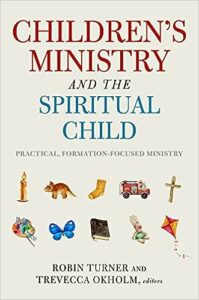Book Review: Children’s Ministry and the Spiritual Child
Guest
By Joel Cook, Worship Pastor of Grace Northridge Church

Children’s Ministry and the Spiritual Child: Practical, Formation-Focused Ministry is a new book edited by Dr. Robin Turner (Director of Children’s Ministries at All Saints Dallas) and Trevecca Okholm. Honestly, I did not expect much of this book. I thought, “How much is there to say about children’s ministry that hasn’t already been said?” Well, I was wrong. Having spent part of my undergraduate time in education courses, I was immediately impressed when I flipped through the book to see the vast number of research studies referenced and cited. Oh, this is legit! This book, however, is not just about the studies. It’s an extremely thoughtful integration of that research into very real, sensitive ministry, accounting for complexity and context, based on years of experience and deep reflection.
When you flip to the table of contents, you’ll see that the editors divide the 14 chapters into four major sections, plus a super-practical conclusion chapter at the end.
Section 1 caught me off-guard because I was immediately invited to slow down, listen to my heart and the Holy Spirit, and make space for seeing from a child’s point of view—especially my own inner child. This sets the stage for the next few chapters, which dignify the spiritual capacity of children and recognize the deep challenges presented to children in our particular cultural moment—not least of which is the residual effect of living through COVID-19. As I mentioned earlier, there is a fair bit of academic research presented. It’s not too intimidating though. It’s not overly dense, and the authors give very practical summaries to understand and apply it. But the overall takeaway for me from Section 1 is “listen first.”
Section 2, which is inseparable from Section 1, connects the initial ideas to the role of the family in the spiritual formation of a child. The authors take us through several fundamental realities of a child’s life that we sometimes wish didn’t matter as much as they do. Family habits and communication, race and emotional safety serve as the indelible foundation of every other thing a child learns and experiences in a ministry context.
In Section 3, we get encouragement not to see children’s ministry as a sequestered area of church life. The emotional maturity of leaders and the ethos of a church will have a significant effect on children’s ministry, whether or not you are aware of it. Furthermore, spiritual formation of children can and should happen in all areas of church, including and especially intergenerational corporate worship. Children have vast spiritual capacity; they simply need more and gentler guidance than adults.
Section 4, addresses and gives guidance on ministering with a strong awareness of the effects of trauma in a child’s life. It also brings awareness and confronts the fact that church leaders can be the cause of that trauma, both physically and spiritually. That is intolerable and should not be taken lightly, and prevention must be in place. This is perhaps the only area in which I think the book is a bit lacking. At the end of Chapter 13, which helps bridge the gap between childhood and adulthood with thoughtful advice on ministering to teens, there is a list of recommended resources. A list of recommended resources for abuse prevention and healing would be a welcome addition to chapter 12.
Finally, Robin Turner concludes with boots-on-the-ground practical advice that is fantastic and encouraging.
I asked two parishioners to read and review this book with me. I’ll share some of the summary and comments provided by one of them: John D. Mays of Novare Science (a curriculum line of Classical Academic Press).
“I am enthusiastic about this book and recommend it to everyone who works in ministry in a church in any capacity. Children’s ministry wisdom is not just for children’s ministry workers; it is inherently of interest to clergy, church leadership and teachers because the amount of attention that must be given to children and their ministers in a church is huge. I do not normally gravitate to books of this sort, just as I do not gravitate to business books, even though they might help me be better at my business. But several things make this book a most valuable read.
“First, while all children’s ministry workers presumably desire to be a blessing to children, no one should take it for granted that everyone is equally capable of figuring out how to do that. Discovering best practices, ways of listening and appropriate kinds of things to say or not say is crucial. This book is loaded with these kinds of insights.
“Second, the crazy cultural scene we are living through has created many hazards. It is essential that church workers know what they are and participate in meaningful discussion and training about how to manage them.
“Third, the sheer diversity of the topics addressed makes reading the book a valuable short course in ‘stuff you should know if you are a youth or children’s ministry worker.’
“Fourth, 50 years ago people took church ministry work for granted, just as they took most other kinds of work for granted. This book is essentially a helpful guide to loving people in a particular context, namely, that of helping children to grow in loving God and loving people themselves.”
I am not a children’s minister, but I have experience in education and have served in ministry to youth, young adults and the broader congregation. Plus, I have three (soon to be four!) kids of my own. This book, as John Mays said, is worth a read for almost everyone in ministry. It’s a gold mine. I can see us using this book in part or in whole for a wide variety of ministry areas at our church as we seek to push back against the worldly trend of anxious fragmentation toward integrated, healing spiritual formation resting upon the gospel of Jesus Christ.











